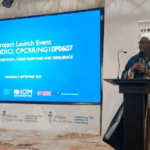More than 25,000 delegates gathering in Addis Ababa for the Second Africa Climate Summit this week are being urged to reimagine climate-driven migration as an opportunity for innovation rather than just a crisis to manage. The International Organization for Migration (IOM) is leading calls for a fundamental shift in how African leaders approach displacement, arguing that strategic migration policies could help the continent build resilience against climate change while driving sustainable development.
Thank you for reading this post; don't forget to subscribe to our YouTube channel here!
“Climate-induced mobility presents not only challenges but also opportunities to shape Africa’s future,” said Mohammed Abdiker, IOM Chief of Staff, as the summit opened in Ethiopia’s capital. “IOM’s research shows that when migration is integrated into climate action, cities can become spaces of innovation and inclusion.”
The message comes as Africa faces disproportionate climate impacts despite contributing less than four percent of global emissions. Rising droughts, floods, and environmental degradation are displacing millions across the continent, with traditional responses often treating migration as a problem to be solved rather than a potential solution.

IOM’s Continental Strategy for Africa 2025-2029 prioritises African-led, evidence-based solutions that position human mobility as a catalyst for adaptation and sustainability. The approach represents a departure from conventional thinking about climate displacement.
“We need to stop seeing climate, mobility, and security as separate issues,” explained Rania Sharshr, IOM’s Director of Climate Action. “When managed inclusively, human mobility can be more than a coping mechanism – it can be a driver of peace and climate-resilient development.
The summit will feature multiple IOM-led sessions with policymakers and the African Group of Negotiators on Climate Change, covering topics from urban adaptation to regional cooperation. A key highlight will be a high-level ministerial dialogue involving Ethiopia, Kenya, and Somalia on climate, conflict, migration, and cross-border cooperation.
Other sessions will examine migration’s role in peacebuilding, displacement preparedness, and youth engagement in policy processes. The discussions will also spotlight the Kampala Ministerial Declaration on Migration, Environment and Climate Change, which IOM is advancing alongside African governments.
Climate change’s role as a conflict multiplier features prominently on the summit agenda, with IOM joining the African Union and the Intergovernmental Authority on Development for discussions on regions like the Sahel, Horn of Africa, and Lake Chad Basin, where climate stress exacerbates existing tensions.
The organisation argues that integrated approaches to climate, mobility, and security can transform challenges into opportunities for peace-building and resilient development.
Looking beyond the summit, IOM is advocating for inclusive climate finance and meaningful migrant representation in global forums ahead of COP30. The organisation emphasises the leadership roles of women and youth in resilience-building while championing mobility as a driver of Africa’s innovation capacity.
The Second Africa Climate Summit continues through the week, with African leaders seeking to establish the continent’s climate priorities ahead of international negotiations and to demonstrate African leadership in developing solutions that reflect local realities and ambitions.
Follow the AkweyaTV channel on WhatsApp: http://bit.ly/3I7mQVx








